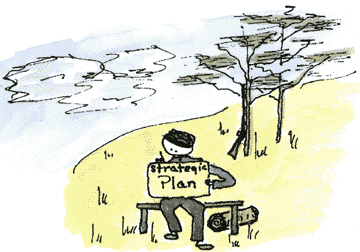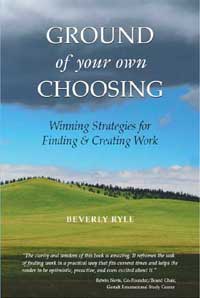Tag
Your Own Advisory Board

Entrepreneurs, small business owners and others who work for themselves enjoy the autonomy that comes with independence but know that there is a downside—feeling alone.
People in transition who are considering starting their own businesses also worry about the isolation that might come with being a freelancer or independent contractor. Maybe they’ve had enough of the sort of being-on-your-own that comes with looking for work, or maybe they feel that if they were self-employed they would miss the stimulation of working with others.
Both groups speak of the need to have someone to brainstorm or problem-solve with, or just to talk business with over coffee. They may prefer not to answer to a higher authority or deal with office politics, but they instinctively know that being challenged now and then keeps them on point and that the expertise of others, particular in business disciplines they are not strong in, can help them achieve their goals.
Spring Cleaning
 During the first week of spring, the temperature dipped into the twenties, the daffodils lay prostrate on the walk, and I devoted an entire day to cleaning out my files.
During the first week of spring, the temperature dipped into the twenties, the daffodils lay prostrate on the walk, and I devoted an entire day to cleaning out my files.
I usually purge them in January to get a fresh start on the year, but I had failed to do so, not only this past January, but also in January of 2011.
So it was time—past time. Too much paper never sorts itself out. The trivial and the important were jammed together, both in the cabinet and in my head.
I soon realized that my neglect to use organization as a strategic planning tool (see Wildly Organized) was symbolic of an ambivalence about where I am in my professional life.
Resume Magic or Futility?
 Recently I was on my way home from a visit to a friend in Philadelphia, and after I boarded the train at 30th Street Station and settled into my seat, I noticed a man in his mid-fifties across the aisle from me.
Recently I was on my way home from a visit to a friend in Philadelphia, and after I boarded the train at 30th Street Station and settled into my seat, I noticed a man in his mid-fifties across the aisle from me.
His well-dressed, distinguished look suggested to me that he was probably a senior executive en route to an important business meeting in New York, with maybe a round or two of golf or an afternoon of sailing in Long Island Sound on the side.
From the weathered, high-quality leather briefcase beside him on the seat, he took out a thick book entitled, Best Resumes, and with a sigh I added “unemployed or afraid of becoming so” to the description of him I had been forming in my head.
Skaneateles Redux
 Note: this is a reprint of a newsletter column which appeared November 10, 2006. I really am in Skaneateles at the moment, and I'm looking forward to sharing the strategic lessons I learn this year with you in a later post. Bev.
Note: this is a reprint of a newsletter column which appeared November 10, 2006. I really am in Skaneateles at the moment, and I'm looking forward to sharing the strategic lessons I learn this year with you in a later post. Bev.
I'm sitting in the cozy living room of a house perched on the side of a steep hill overlooking Skaneateles Lake. (Pronounced "skinny-atlas," it's the second easternmost of New York's Finger Lakes). From my comfortable wide-armed mission chair I have a 180-degree view of the calm, glistening water through the windows that surround me on three sides. There is no sound except for the gentle lapping of the waves, the chatter of a kingfisher, and the clicking of the keys on my computer.
I am on retreat from the office, from my complicated schedule, from being flat out.
My decision to come here was a strategic decision, and I use the word "strategic" intentionally for three reasons.
Why Businesses Fail, Part 2: Know Yourself
 Small business owners and managers may not have the six-figure incomes, paneled offices and private jets of corporate executives but they have the same responsibility—leadership.
Small business owners and managers may not have the six-figure incomes, paneled offices and private jets of corporate executives but they have the same responsibility—leadership.
Top managers do not spring into existence out of nowhere.
They are selected because they are suited for the job, and they are carefully groomed through extensive training and a highly structured career path. They don't just wake up one morning and find themselves in charge.Small business owners, on the other hand, often do, and many of them are ill-equipped for it.
It is critical that a person who is thinking about starting a business find out how well she fits the leadership role she will have to assume. Corporations use tools to evaluate candidates for management, and small business owners should do the same.
Why Businesses Fail, Part 1: Know Your Market
Ask small business owners why some of them fail and they'll tell you it's because they don't make enough money. This makes about as much sense as saying that Enron went under because the price of its stock fell.
It begs the question, why don't they make enough money, and misses the opportunity to seek out fundamental causes like:
- Financial projections based on wishful thinking rather than real numbers and actual market conditions.
- Failure to articulate and communicate the value of a product or service.
- Inadequate professional development of the owner or manager
Skaneateles
 I'm sitting in the cozy living room of a house perched on the side of a steep hill overlooking Skaneateles Lake. (Pronounced "skinny-atlas", it's the second easternmost of New York's Finger Lakes).
I'm sitting in the cozy living room of a house perched on the side of a steep hill overlooking Skaneateles Lake. (Pronounced "skinny-atlas", it's the second easternmost of New York's Finger Lakes).
From my comfortable wide-armed mission chair I have a 180-degree view of the calm, glistening water through the windows that surround me on three sides. There is no sound except for the gentle lapping of the waves, the chatter of a kingfisher, and the clicking of the keys on my computer.
I am on retreat from the office, from my complicated schedule, from being flat out.
My decision to come here was a strategic decision, and I use the word "strategic" intentionally for three reasons.
First, because one of the best things I can do for my clients (and myself) is to leave them periodically.
Second, because how I "lead" in my personal life is just as much a function of being a leader as how I run my business.
And lastly, I have to use the same care and diligence in planning renewal time as I do in planning any other element of my professional life. It's the only way I can keep it from slipping away from me.
Are You Fighting the Last War?
 In a recent column, I conjured up the vision of an unemployed techie named John. I had him charging up the hill under fire armed with nothing more than a resume and having something less than a fifty-fifty chance of closing with that well-entrenched employer on top.
In a recent column, I conjured up the vision of an unemployed techie named John. I had him charging up the hill under fire armed with nothing more than a resume and having something less than a fifty-fifty chance of closing with that well-entrenched employer on top.
When a person loses his job, or feels threatened by impending layoffs or outsourcing or shaky economic conditions, the most natural thing is to reach for what is most handy—a resume.
But this impulse to reach for the "equipment" and neglect strategic planning is not going to win the battle. It could even undermine the entire offensive.
Pickett’s Charge
 Several years ago, my husband and I visited Gettysburg National Military Park. As we were making our way around the battlefield on bicycle, we came across a marker indicating the place where three divisions of General James Longstreet's corps set off on what has come to be known as Pickett's Charge.
Several years ago, my husband and I visited Gettysburg National Military Park. As we were making our way around the battlefield on bicycle, we came across a marker indicating the place where three divisions of General James Longstreet's corps set off on what has come to be known as Pickett's Charge.
There we noticed that a wide path had been mowed through the tall grass to allow people to trace on foot the route of that ill-fated attack. We got off our bikes and walked them up the hill in reverent silence.
It was hard to believe that this beautiful spot, where we were surrounded by cornfields and gently swaying wildflowers and the hum of summer insects, could have been the scene of so much carnage.
The 200-Year Plan
 When I was considering whether to pursue a Master's in Counseling, I went to talk to a highly respected career professional about it.
When I was considering whether to pursue a Master's in Counseling, I went to talk to a highly respected career professional about it.
When I lamented that it would take me until I was 45 to complete the program, he said to me, ”You need to think in terms of a 200-year plan.“
At the time I thought he was crazy, but now I hear myself saying the exact same thing to my clients.






